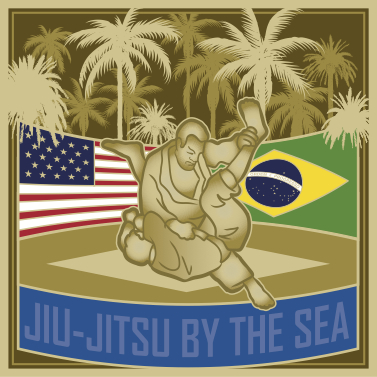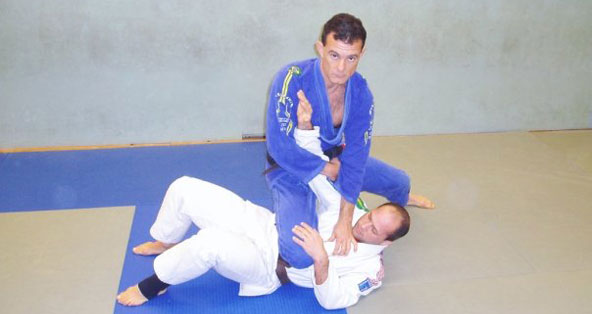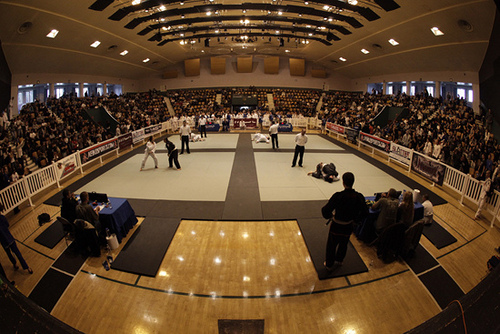It all started at 4:30 in the morning on Sunday, January 22, when I pulled myself out of bed to hit the road to extract lessons at the maiden All Star Jiu-Jitsu tourney promoted by our GMA Cláudio França.
Lesson number one: if your reason for going wasn’t to watch the NFC conference final between home team 49ers and the New York Giants, it was not the appropriate occasion to visit San Francisco. Rain fell on the California desert, and the airports were packed.
But everything seemed to be running along smoothly at eight that morning; I was already dozing off in my seat, and the airplane awaited takeoff on the tarmac. That was when I cracked my eyes and realized, we were back in the hangar. Something had bust in the plane. To spare readers the personal soap opera, we’ll cut straight to the chase: I didn’t get to the Santa Cruz Civic Auditorium, the venue for the event, until 3:30 in the afternoon.

On a day of Jiu-Jitsu and football, the bearded Bradford Sandoval got the better of Erik Benaquisto at All Star in Santa Cruz, CA.
I made it in time to witness Erik Benaquisto losing to Bradford Sandoval in the semifinals of the master black belt middleweight division. A forlorn Erik, still out of breath, made the obvious assessment: “The lesson of the day is to not skip cardio training.” His undoer, Bradford, would go on to lose to Luis Fraga in the decider.
JIU-JITSU VS. AMERICAN FOOTBALL
Also the promoter of the US Open and American Cup franchises, Cláudio França reaped his own lessons from the day: “Look, it’s best not to schedule a tournament for the same day as an American football final,” he said. Contemplatively, he pointed to the stands, already empty at a point in the competition when the gym would usually be packed—during the white belt contest. And he drew his conclusion: “But I’m pleased; it’s the first installment of the event and the number of sign-ups exceeded expectations.”
Sporting a referee outfit, the good-natured Puerto Rican Marcos “Yemaso” forwent putting on his gi, but he did come over to shoot the breeze as usual, and he fumbled when I inquired as to what his lesson of the day was. “Well, this is a special place for me. It was there, at that corner over there, that I started my first competition ever, with two months of Jiu-Jitsu training, back in 1999,” he said, but was cut short, as his services were required elsewhere.

Young local brown belt talent Nathan Mendelsohn occupying his usual first-place spot on the podium
Meanwhile, blue belt Nicholas Greene celebrated victory in the blue belt absolute division by busting out an elaborate break dance routine in the match area (“It was my hobby before Jiu-Jitsu,” he explained). The runner-up, Arizona native Gary Hatch, derived his technical lesson from the encounter: “I shouldn’t have let him get to north-south.”
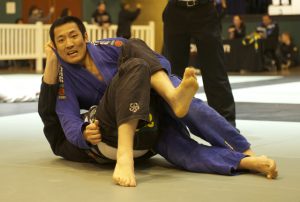
Former break dancer Nicholas Greene shone in the blue belt absolute.
At purple, teammates Amir Mahboobi and Benjamin Mendoza determined the winner of the final by doing odds or evens. Before the match had even started Amir had already taught me a lesson—not of the day but of life: “Don’t lose!” Unfortunately, he only stayed true up until the final, as Mendoza got the better luck of the draw and took the gold.

Benjamin Mendoza gets the takedown to win the purple belt absolute at the All Star Jiu-Jitsu tournament.
Yemaso didn’t leave before completing his thought: “This was where I started, and Jiu-Jitsu has given me so much. Now I’m happy to be refereeing and giving a bit back to Jiu-Jitsu. The lesson, at least to me, is gratitude. Always be grateful.”
THE ONLY DEFINITIVE DEFEAT, IN BOTH JIU-JITSU AND IN LIFE
With fine rain drizzling and my pack full of learning, I hopped highway 17 and cut through the hills heading for San Francisco. Meanwhile, in overtime, the Giants earned their berth at Super Bowl XLVI, and the mood was funereal at the airport in San Francisco—where thousands of fans, heads downcast but still sporting red, would soon be making their way home.
The greatest lesson of the day could be from either football or Jiu-Jitsu; it doesn’t matter. It’s that you just can’t take seriously a temporary defeat—that setback at an event, or in a match, that doesn’t extend past that one moment in life. The only definitive defeat is quitting.
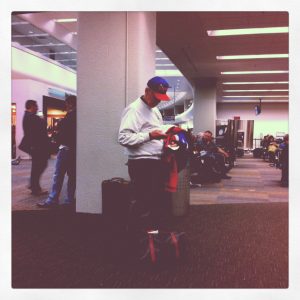
A lone Giants fan at the dismal airport following the 49ers' defeat


